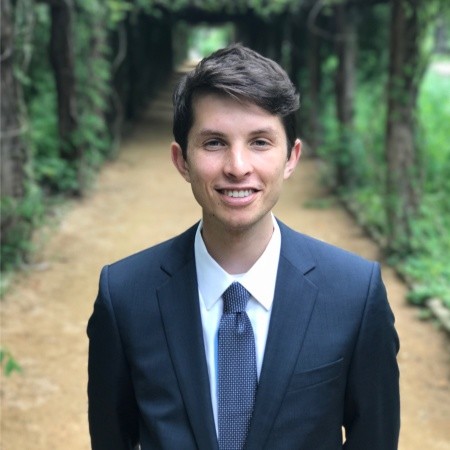Alumni News
A Microbiologist Tackles COVID-19
Justin Hart, 2014 Great Lakes Summer Fellow
.
 In the midst of the rapid spread of COVID-19 in 2020 and 2021, Justin Hart saw a way to apply his background in microbiology and water management to a new, global challenge. Hart joined teams that used a new way to monitor the spread of COVID-19 and other infectious diseases in major cities: wastewater surveillance. Because individuals infected with the virus leave particles of SARS-CoV-2 in their stool, sampling wastewater, also known as sewage, in key areas throughout cities is a viable way to trace how the virus spreads over time. Hart’s career illustrates all the scientific work being done behind-the-scenes to protect us from a global crisis.
In the midst of the rapid spread of COVID-19 in 2020 and 2021, Justin Hart saw a way to apply his background in microbiology and water management to a new, global challenge. Hart joined teams that used a new way to monitor the spread of COVID-19 and other infectious diseases in major cities: wastewater surveillance. Because individuals infected with the virus leave particles of SARS-CoV-2 in their stool, sampling wastewater, also known as sewage, in key areas throughout cities is a viable way to trace how the virus spreads over time. Hart’s career illustrates all the scientific work being done behind-the-scenes to protect us from a global crisis.
As a CIGLR Summer Fellow in 2014, one of only a handful of students chosen to assist with research at the Cooperative Institute for Great Lakes Research, Hart worked on a project with Dr. Lauren Fry and Dr. Eric Anderson to monitor the water quality along the Clinton River near a popular swimming beach. The group measured fecal indicator bacteria, which are exactly what they sound like: bacteria commonly found in feces that indicate water is contaminated, at a possible risk to beachgoers. The project helped CIGLR researchers better understand the upstream conditions that contribute to poor water quality in Lake St. Clair. In Hart’s own words, “My time as a summer fellow at CIGLR introduced me to the idea that, as humans, we leave evidence of our infections in the environment through the microbes we shed, and that by measuring certain microbes we can better understand how to protect public health. It’s been remarkable to see the amount of work and research in this field during the pandemic and how useful this approach has been.”
In both Chicago and Boston, Hart has managed wastewater surveillance programs that focus “upstream” in various neighborhoods, where samples are gathered from manholes rather than “downstream” at the wastewater treatment plants. By looking upstream, the program can focus on specific neighborhoods that have faced greater harm from COVID-19. Using the same skills in CIGLR, where he was sampling rivers, Hart worked on testing wastewater treatment plants, local sewers, and specific facilities deemed “high-risk” that serve Chicago residents in his role at the Chicago Department of Public Health. In 2023, Hart took a new role as the Wastewater Epidemiology Program Manager at the Boston Public Health Commission, transferring the same wastewater surveillance work he did in Chicago to the city of Boston. Not only did the surveillance program trace the spread of COVID-19 throughout 11 testing sites, Hart and his team identified neighborhoods at a greater risk for high rates of the virus, ensuring that disadvantaged areas would not be ignored.
“Water, and sewage especially, can tell many stories depending on what question you ask. We’ve been asking “How are things going in each neighborhood? Are there more infections or fewer?” and the sewage has done remarkably well at reflecting what’s happening and at predicting clinical data, such as reported COVID-19 cases and hospitalizations,” said Mr. Hart.
